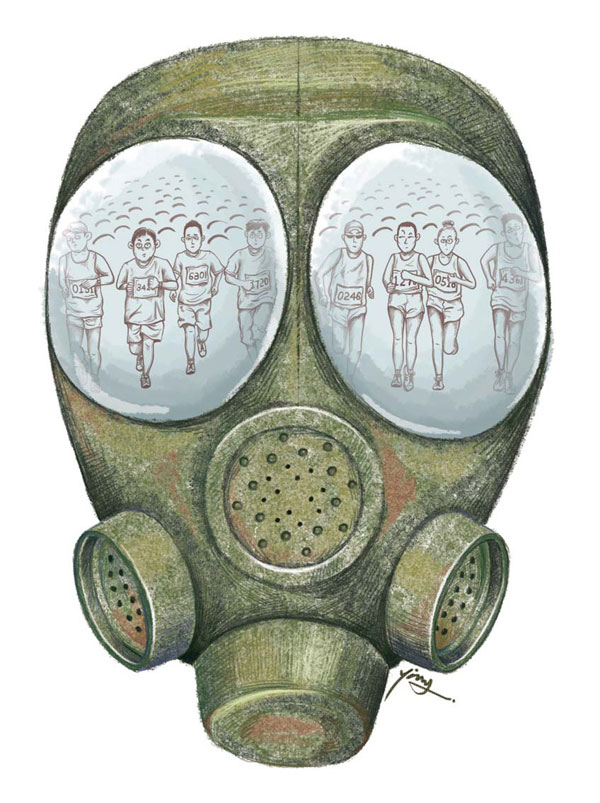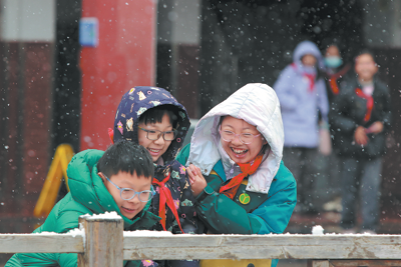Long-distance runner's sad lot: a bad air day





A marathon run in thick smog places in ironic relief the plague of air pollution that is choking Chinese cities
I've always admired sports enthusiasts for their perseverance, but my envy stopped on Oct 19 when tens of thousands of them took to the streets for the annual Beijing marathon.
It was a smoggy day. The level of PM 2.5, particulate matter with a diameter of 2.5 micrometers or less, reached an extremely hazardous level of 344 at 8 am when the race started. That was not the worst in recent weeks, with some days so choked with dirty air you could hardly see the buildings across the street, but the Sunday on which the marathon was run was obviously unsuitable for strenuous outdoor activity.
The organizers issued warnings that anyone who felt ill at ease should stop immediately, and senior citizens were discouraged from taking part. There were 26,000 registered for the complete 42 kilometers and an additional 6,000 for the 21 km course.
But their tenacity became the fodder for online ridicule. There was a joke that the smog was largely dispersed - with PM 2.5 dropping to about 100 - by early afternoon because so many people had sucked it in. This droll piece ends with a calculation that human breathing, while detrimental to your health, would not make a dent to the reduction of smog because 30,000 people acting as air purifiers would absorb only the amount of gas emissions from 600 cars covering the same distance.

The organizers were in an awkward spot. They did all they could to reduce the effects of the smog, advising runners to breathe with their noses rather than their mouths, spraying surrounding areas with water, etc. But they did not call it off. With about 40 percent of the participants from out of town, a last-minute cancellation would have affected them more adversely than it would have affected Beijingers.
Normally, autumn is the best season in the capital. Because of the color of the leaves it is dubbed golden autumn. But nature is unpredictable. The absence of wind coupled with the persistence of fog wreaks havoc with the city's weather, or, as gallows humor would have it, turns the city into a misty-colored poetic mood with low visibility.
Beijing is as beautiful as the best setting in the world for running a marathon if it takes place straight after a night of strong wind. But being able to pick such a day is a cat-and-mouse game, and an event with the organizational complexity of a marathon cannot afford such a game. So ultimately the organizers are at the mercy of the elements.
While the chorus of lamentation surfaced online, some turned on the critics for playing armchair analysts. The participants were bound by all kinds of constraints as well, they said, and could not just decide to stay away. Many had prepared for a year or more, and some had obligations to fulfill. I have a friend whose participation was sponsored by advertisers, so in a sense he had no choice. Next time he should have it in the contract that he be given the right to opt out on the grounds of air pollution.

Anyway, one mark of progress is transparency and here I am obviously not talking about the air. The public was given updated information on the level of pollution, and that allows them to make a better-informed choice on whether they should run. Still, peer pressure could play a role here. One Chinese university has reportedly registered 6,000 participants for a marathon and anyone dropping out would be likely to lose face in front of schoolmates. But the entrants are all adults, so they ought to be able to be responsible for themselves.
The harshest criticism relates to the purpose of sports. A marathon, many critics argue, is to promote physical fitness through exercises, and if an event will obviously do more harm than good to the health of the participants, it subverts the ultimate goal.
Indeed there were participants who had hoped the race would be canceled, among them my friend. I imagine official cancellation would have freed him from his sponsorship obligations. He said he would stay away next time PM 2.5 rises above 200. However, he did not buy into the macabre scenario that some online pessimists painted.
Others contend that smog should be treated as an occupational hazard, just as injury is to a football player. You are aware of its damage but you go into it anyway. Besides, the exact damage from running 42 km, with or without precautions such as masks, is difficult to gauge accurately and will not show up immediately apart, perhaps, from a dry cough or two.
But this year's Beijing marathon did serve to highlight this environmental problem better than any awareness campaign. A constant stream of real-time on-site photos from the race, with white masks dotting the foreground and a haze enveloping everyone, present a surreal image for a hazard that has been plaguing the country, and Beijing in particular.
While fog is natural, the three major components of smog are man-made. Experts say that gas emissions from coal burning and motor vehicles, plus dust, form the backbone of the city's air pollution. There is no easy cure, and Beijing will be unable to solve the problem alone. Hebei province, which surrounds the city, is heavily industrial, and some of its cities are even more polluted.
Now that the sources of smog have been identified, policy-makers need to take action to tackle them. And they have, or are starting to. For example, Hebei pledged to reduce its steel production by 20 percent in five years. That entails the loss of 140 billion yuan ($23 billion; 18 billion euros). And that is just one area out of many. With such big stakes, local governments obviously have to weigh the costs against the benefits.
But any complete cost-benefit analysis has to take into account the harder-to-gauge cost to health and comfort. One may be able to attribute a sudden bout of cough to a particularly bad smoggy day, but causes of many illnesses are almost impossible to quantify. (Attempts are being made, though, including one runner who carried a gadget that simulated human breathing.) Someone who inhaled too much smoggy air may not suffer from the consequences until decades later when his health starts failing earlier than it otherwise would.
As for comfort, nobody can tally the value of a blue sky, fresh air and the scent of flowers. Usually one is unaware how precious these things are until they are gone. Speaking of comfort, solving air pollution is not just the government's responsibility, it is everyone's. Driving may be a thing of comfort compared with squeezing onto buses and subway trains, but it results in more PM 2.5 emissions. So, the trick is in the balance.
Ideally, environmental costs should be curtailed even as the economy is taking off. That could be too much of a luxury for most places. It is too late to cry over spilled milk, but now we have reached another crucial stage, a threshold so to speak, across which will be the point of no return. This year's Beijing marathon is an acute reminder of how things will go on if we fail to muster the courage and tackle the problem head-on.
The writer is editor-at-large of China Daily. Contact him at raymondzhou@chinadaily.com.cn

(China Daily Africa Weekly 10/24/2014 page36)
Today's Top News
- Retired judges lend skills to 'silver-haired mediation'
- Are you ready for robots to roam your streets?
- Good start for new five-year plan stressed
- Nation calls for cooperation and free trade
- IMF upgrades China's growth forecast to 4.5%
- US' coercion threatens global governance


























